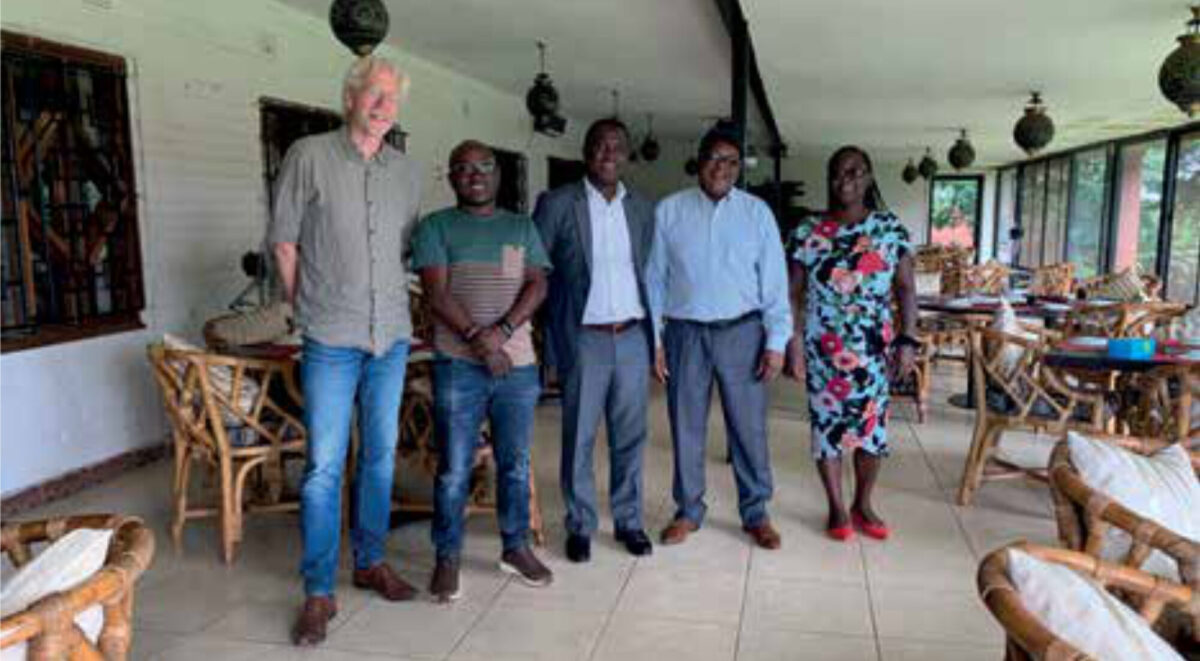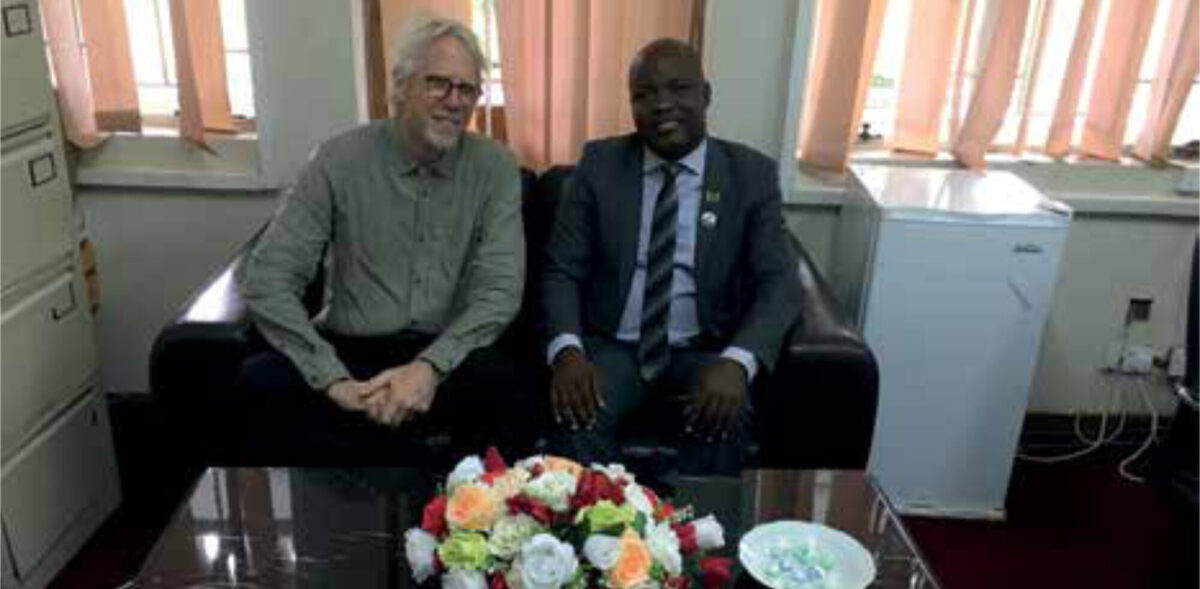Main content
Sytse Fluitsma graduated in den-tistry at University of Amsterdam in 1979.[1] While practicing dentistry in the Netherlands for more than 40 years, he also dedicated time to promoting good oral health abroad. It started with the opportunity to work for Memisa Medicus Mundi in Malawi, which was the start of a lifelong commitment to improving (oral) health in children through the promotion of healthy practices and conditions for children, preferably at a young age.
In this interview, we talk about his devotion to the work in Malawi and also learn about his contin-ued drive to care for the neglected closer to home. In the Netherlands, he addresses the needs of those whose access to dental services is challenged, including asylum seekers, drug users, and squatters. Throughout his career at home and abroad, Fluitsma has practiced den-tistry as a two-way street, as more than treating tooth decay, and has remained curious about “the person behind the rotten tooth.”
Prevention for better health
In 1994 Sytse had the opportunity to work as a dentist in Malawi for three years. In those days, Malawi was a poor country, and it still is. “After working for 15 years in Amsterdam, I felt it was time for an adventure. I was contracted by Memisa to work as dentist in a small referring hospital in the North of Malawi, St John’s Hospital in Mzuzu. During those first years, I noticed the difficulties of working as a dentist in a low-income country. The treatment is mainly focused on curation instead of prevention, and the lack of manpower and supplies is evident. This hasn’t changed that much over the past decades. A strong focus on prevention and encouragement of healthy practices at the primary school level will give these future adults a good start in life.”

A meeting with dr. Wim van Palenstein Helderman – professor of Preventive Health Care at the University of Nijmegen – during the 2008 congress on ‘Dental Aid in Underdeveloped Countries’ led to a longstanding col-laboration. At this congress, Helderman presented the Fit for School programme in the Philippines, a childhood disease prevention programme consisting of three main elements: hand washing with soap, tooth brushing with fluoride toothpaste and bi-annual deworm-ing. Stimulated by the success of this approach in the Philippines, Helderman and Fluitsma looked at possibilities to adapt the programme for Malawi. Fluitsma: “For a low-income country like Malawi, the focus on prevention of diseases is very important. Though the vaccination coverage for preventable diseases like polio and smallpox is relatively high, the access to clean water and sanitation facilities is extremely poor. Children continue to suffer from generally preventable diseases that challenge their physical, mental and social development. Ignorance of this problem contributes to a stagnation of the country’s progress in all fields. Information and practical approaches that can improve schoolchildren’s health is lacking. One way to handle this problem is to inform all levels of society and collaborate with local communities to stimulate and enable them to take matters into their own hands.“
Engaging the government and local communities
From the outset, it was clear that involvement of the government was vital, so in 2012/2013 a taskforce with government officials was formed to join with the Ministry of Health to introduce Fit For Learning Africa and develop a pilot programme called Wash Brush Smile (WBS), a joint partnership between the Malawian Government, UNICEF, World Vision Malawi and Fit For Learning Africa (FFLA). Fluitsma: “In order to increase the sustainability of interventions tackling common avoid-able diseases, it was necessary to integrate the WASH (water, sanitation, hygiene) activities, as promoted by Unicef, World Vision and FFLA, into the School Health and Nutrition and WASH programme of the Malawian government. This helped to focus in a more holistic way on the preven-tion of common childhood diseases caused by inadequate personal hygiene habits”.[2]
In addition to securing support from all levels of society and local communities, the core programme stresses safe water and hygiene practices at the schools themselves. Fluitsma: “Children are taught to wash their hands each time they visit the toilet and each time before and after they eat food or play in soil and water environments. This concept deliberately targets junior standards 1 and 2 children, following the principle that learning habits like hand washing and brushing teeth at a young age increases the chance that this will become a lifelong practice. The Wash Brush Smile (WBS) programme is conceptualized on the idea that children learn better when they are healthy. It therefore focuses on the prevention of com-mon (child) diseases such as diarrhoea, pulmonary infections, soil transmitted helminth (STH) infections and tooth decay. It is an attempt to stop ‘com-mon’ childhood diseases by tacking root causes. Additionally, we promote “Keep girls in school”, an advocacy programme encouraging girls to stay in school during their monthly period and facilitating the provision of sanitary rooms where they can hygienically change sanitary pads. In this context, Mother Groups are encouraged to start the production of pads for their own children and for girls in other schools.“
The goals of the WBS programme are twofold: preventing common child diseases and promoting a good learning environment at primary school level, thereby enabling children to concentrate better in class, improve their academic performance, and achieve their edu-cation potential while also reducing the school dropout of girls and boys. Therefore, the WBS programme also works with local communities, parents and teachers of primary schools. “This enables local stakeholders to achieve control over improving conditions, which in turn encourages them to sustain their activi-ties and obtain ownership of their school health programme and ultimately achieve the full potential of their children’s educa-tion.” In addition, the programme also aligns with other WASH activities in the environment such as the construction of protected water sources and hygiene facilities (implemented by UNICEF).
Sustainability of practices
The programme experienced some setbacks as a result of the Covid-19 pandemic. However, an assessment of the 20 schools involved in the pilot showed the benefits to date. “The project beneficiaries presented success stories. They wished they could continue with the project in order to be fully equipped with WASH skills and knowledge including brushing teeth the right way. The knowledge and skills acquired by primary beneficiaries (learners) have gone beyond them as initially planned.” Fluitsma mentions that there is, besides the direct effect on the learners, a trickle-down effect on their parents and siblings: “This is very important for the sustainability of gains realised from the project, includ-ing changing attitudes and practices. The level of community participation was reported to be very high. This was also demonstrated in the contribution by local communities of labour and locally available resources such as bricks for construction of hand washing stands. The enthusiasm and demand-driven approach involving learners, teachers and parents generate confidence to recommend further replication of the interventions.”
Oral health in the netherlands: unseen needs
It was during his study of dentistry that Fluitsma started to care for the underserved. He volunteered in youth clubs and in his dentist practice focused on clients without private insurance. Not long after he returned home, he discovered ‘the third world’ in the Netherlands, as he started to work for those with limited or no access to dental care, namely people with an addiction. For Fluitsma this was his rehab from Africa. Treating drug addicts with ter-rible tooth decay and crumbling teeth proved fulfilling, as a good set of teeth reduced shame, enabled them to (re) gain a sense of self-esteem and take part in society again. Though the circum-stances in the Netherlands differ vastly – as here we have everything, includ-ing high-tech equipment in the dental practices and hospitals – Fluitsma recognizes “similarities when it comes to accessing essential health care for certain groups in the Netherlands and how we value prevention. Good health care starts with prevention, hence the focus on this essential part in the health care system in the project in Malawi. This lesson learned may also be quite useful in the Netherlands“. In the Netherlands, den-tistry is also not included in the basic health care package (only for children up to 18 years), and fewer and fewer people are opting for an additional insurance covering basic oral health care.[3]
Future outlook
Most oral diseases are preventable, according to Fischer et al in The Lancet (2018).[4] This is where the oral health workforce plays an important role. But there is also more to gain from mak-ing better use of oral health and other healthcare workers: “A fit for purpose oral health workforce can enable equitable and improved health outcomes and could have an important role in addressing differential health outcomes. Dentists are generally underused in the management of other NCDs and are well placed to assume an enhanced role. Where there are no dentists, the health workforce might be more fully used to expand and extend oral health.“[4] According to the authors, the use of other healthcare workers in oral health is one of the three proposed areas for integrating oral health in universal health coverage (UHC).[5] To help reinforce oral health services in Africa, the WHO and the Harvard School of Dental Medicine started roll-ing out oral health training for primary care workers, including community health workers.[6] Besides giving due attention to prevention, such initiatives are important steps in meeting the needs for oral care services in Africa.

For more than two years during the height of the Covid pandemic, Fluitsma did not return to Malawi. Schools were closed and there was little room to restart the programme. In March, he went back to sign a memorandum of understanding (MOU) with World Vision and to continue the work. The WHO promotes an essential oral health package for low-resource settings in Africa as part of the WHO package of essential NCD interventions.[7] The WBS programme, containing oral health interventions developed for school and community settings in Malawi, can be seen as an example of how people can take control of their oral health.
Notes and references
- Fluitsma is also board member of Dental Health International Nederland; Friend of St John’s Mzuzu, Kaviwale Nederland; and founder and CEO of Fit For Learning Africa.
- For more information on the programme and the organisation: https://fitforlearningafrica.com
- https://doktersvandewereld.org/campagnes/mondzorg/
- Strengthening oral health for universal health coverage, see: www.thelancet.com Vol 392 September 15, 2018. https://www.thelancet.com/journals/lancet/article/PIIS0140-6736(18)31707-0/fulltext
- The other two areas are: integrated essential oral health services and a basic package of oral care; and financial protection and inclusion of dental care coverage in health insurance packages, as well as expanding fiscal space for oral health care.
- https://www.afro.who.int/news/filling-gaps-oral-health-services-africa
- World Health Organization Regional Office for Africa (2016). Promoting oral health in Africa. Prevention and control of oral diseases and noma as part of essential noncommunicable disease interventions. WU 140. Brazzaville: World Health Organization Regional Office for Africa, 2016.

















































